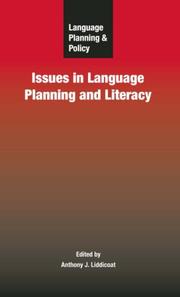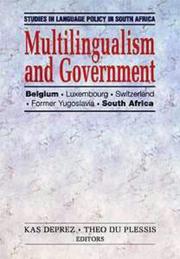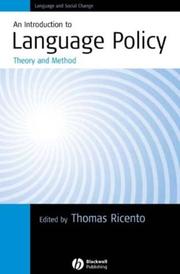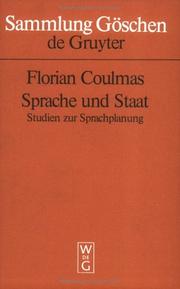| Listing 1 - 10 of 405 | << page >> |
Sort by
|
Book
ISBN: 0853898154 Year: 2001 Publisher: Belfast : Cló Ollscoil na Banríona,
Abstract | Keywords | Export | Availability | Bookmark
 Loading...
Loading...Choose an application
- Reference Manager
- EndNote
- RefWorks (Direct export to RefWorks)
Language policy --- Glottopolitics --- Institutional linguistics --- Language and languages --- Language and state --- Languages, National --- Languages, Official --- National languages --- Official languages --- State and language --- Communication policy --- Language planning --- Government policy


ISBN: 9781853599774 1853599778 9781853599781 1853599786 1280935049 9786610935048 9781280935046 6610935041 Year: 2007 Publisher: Bristol Blue Ridge Summit
Abstract | Keywords | Export | Availability | Bookmark
 Loading...
Loading...Choose an application
- Reference Manager
- EndNote
- RefWorks (Direct export to RefWorks)
While literacy has always been central to language planning work, there are fewer studies which focus primarily on literacy as a language planning activity. Often planning for literacy is treated as an aspect of status, corpus or language-in-education planning, rather than addressing literate practice itself as a planning objective. This volume investigates the complex issues and social and political pressures relating to literacy in a variety of language planning contexts around the world. The studies presented in this book examine language planning for literacy in official and vernacular languages and address issues relating to literacy in first and additional languages in North America, Asia, Africa, Europe and the Pacific. As a collection, these studies show that language planning for literacy is not simply a matter of planning a written version of a language, but involves more complex questions relating to the nature and practice of literacy and the power relations which exist within societies.
Language planning --- Language policy --- Literacy --- Language planning. --- Language policy. --- Literacy. --- Languages & Literatures --- Philology & Linguistics --- Illiteracy --- Glottopolitics --- Institutional linguistics --- Language and languages --- Language and state --- Languages, National --- Languages, Official --- National languages --- Official languages --- State and language --- Planned language change --- Government policy --- Planning --- Education --- General education --- Communication policy --- Sociolinguistics --- language and society. --- language policy. --- literacy in language planning. --- literacy. --- literate practice. --- official languages. --- power.

ISBN: 0627024785 Year: 2000 Volume: 1 Publisher: Pretoria Van Schaik
Abstract | Keywords | Export | Availability | Bookmark
 Loading...
Loading...Choose an application
- Reference Manager
- EndNote
- RefWorks (Direct export to RefWorks)
Sociolinguistics --- Yugoslavia --- Belgium --- South Africa --- Luxembourg --- Switzerland --- Language policy --- Multilingualism --- Plurilingualism --- Polyglottism --- Language and languages --- Glottopolitics --- Institutional linguistics --- Language and state --- Languages, National --- Languages, Official --- National languages --- Official languages --- State and language --- Communication policy --- Language planning --- Government policy
Book
ISBN: 9783865273376 9788484893066 Year: 2007 Publisher: Madrid : Frankfurt : Iberoamericana Vervuert,
Abstract | Keywords | Export | Availability | Bookmark
 Loading...
Loading...Choose an application
- Reference Manager
- EndNote
- RefWorks (Direct export to RefWorks)
Language policy --- Spanish language --- Political aspects --- Castilian language --- Romance languages --- Glottopolitics --- Institutional linguistics --- Language and languages --- Language and state --- Languages, National --- Languages, Official --- National languages --- Official languages --- State and language --- Communication policy --- Language planning --- Government policy

ISBN: 9781405114981 9781405114974 1405114975 1405114983 9786611214593 1281214590 1405144629 Year: 2006 Volume: 1 Publisher: Malden, Mass. Blackwell
Abstract | Keywords | Export | Availability | Bookmark
 Loading...
Loading...Choose an application
- Reference Manager
- EndNote
- RefWorks (Direct export to RefWorks)
An Introduction to Language Policy: Theories and Method is a collection of newly-written chapters that cover the major theories and methods currently employed by scholars active in the field. provides an accessible introduction to the study of language policy research and language's role in social life consists of newly commissioned essays written by internationally recognized scholars helps define and describe a growing field of inquiry and is an authoritative source for students, scholars and researchers in linguistics, applied linguistics, education, policy studies and related areas includes section overviews, annotated chapter bibliographies, and discussion questions
Language policy. --- Sociolinguistics --- Language policy --- Glottopolitics --- Institutional linguistics --- Language and languages --- Language and state --- Languages, National --- Languages, Official --- National languages --- Official languages --- State and language --- Government policy --- Communication policy --- Language planning

ISBN: 3110104369 3110852756 9783110104363 Year: 2012 Volume: 2501 Publisher: Berlin ; Boston : De Gruyter Mouton,
Abstract | Keywords | Export | Availability | Bookmark
 Loading...
Loading...Choose an application
- Reference Manager
- EndNote
- RefWorks (Direct export to RefWorks)
Sprache Und Staat: Studien Zu Sprachplanung Und Sprachpolitik (Sammlung Goschen)
Language planning. --- Language policy. --- Language planning --- Language policy --- Language and languages --- Planned language change --- Sociolinguistics --- Glottopolitics --- Institutional linguistics --- Language and state --- Languages, National --- Languages, Official --- National languages --- Official languages --- State and language --- Communication policy --- Planning --- Government policy
Book
ISBN: 8772898682 8763505274 9788763505277 Year: 2006 Publisher: Copenhagen, Denmark : Museum Tusculanum Press,
Abstract | Keywords | Export | Availability | Bookmark
 Loading...
Loading...Choose an application
- Reference Manager
- EndNote
- RefWorks (Direct export to RefWorks)
Today, English is the predominant foreign language in Denmark and it is so widely spread that many people are concerned for the Danish language. But this is a recent development. As late as a hundred years ago, one could pass one's A-levels without ever having read a single word of English, and even students of the science side were taught more Latin than students of the Classical languages are today. It was the school reforms in 1903 that broke away from the grammar school and gave the modern languages a key position in both the primary, lower secondary and upper secondary schools. From having been scorned as a language of commerce, English was now recognized as a valid cultural language. The book outlines this development and discusses questions, such as: Why did it take so long for the English language to become part of the general education? What connected the Danish political-cultural orientation after 1964 and the development of the language subjects in the schools? Why was the school of Modern languages successful at first when later, in the 1930s, it came up against an identity crisis? The book provides a historical perspective for the topical debate in the upper secondary schools and proves that many of the arguments in this debate have been heard before.
Language policy --- English language --- Germanic languages --- Glottopolitics --- Institutional linguistics --- Language and languages --- Language and state --- Languages, National --- Languages, Official --- National languages --- Official languages --- State and language --- Communication policy --- Language planning --- Study and teaching --- Government policy
Book
ISBN: 9780190458898 0190458895 Year: 2018 Publisher: New York, N.Y. Oxford University Press
Abstract | Keywords | Export | Availability | Bookmark
 Loading...
Loading...Choose an application
- Reference Manager
- EndNote
- RefWorks (Direct export to RefWorks)
"In 35 chapters by leading scholars in language policy and planning (LPP), this exciting new Handbook critically examines current theoretical and methodological transformations taking place in LPP. Sections on LPP theory, nation-states and communities, and late modernity, plus an integrative summary, offer a state-of-the-art profile of LPP and directions for future research"--
Sociolinguistics --- Language planning. --- Language policy --- Language policy. --- Sprachpolitik. --- Glottopolitics --- Institutional linguistics --- Language and languages --- Language and state --- Languages, National --- Languages, Official --- National languages --- Official languages --- State and language --- Communication policy --- Language planning --- Government policy --- Language policy - Handbooks, manuals, etc.
Book
ISBN: 0191745480 1283949482 0191639710 0191639729 9780191639715 9780191745485 9781283949484 9780199646616 0199646619 Year: 2012 Publisher: Oxford Oxford University Press
Abstract | Keywords | Export | Availability | Bookmark
 Loading...
Loading...Choose an application
- Reference Manager
- EndNote
- RefWorks (Direct export to RefWorks)
Globalisation and migration are producing societies of increasing linguistic diversity. At the same time, English is achieving unprecedented global dominance, smaller languages are becoming 'extinct' at an alarming rate, and ethnic tensions in countries from Belgium to Tibet continue to centre on questions of language. Against this background, the issue of how to ensure justice between speakers of different languages becomes a pressing social concern. Matters of 'linguistic justice'are therefore drawing increasing scholarly attention across a range of disciplines.How does international law con
Language and languages --- Language policy. --- Law and legislation. --- Glottopolitics --- Institutional linguistics --- Language and state --- Languages, National --- Languages, Official --- National languages --- Official languages --- State and language --- Communication policy --- Language planning --- Government policy
Book
ISBN: 3110476924 3110479230 Year: 2019 Publisher: Berlin ; Boston : De Gruyter,
Abstract | Keywords | Export | Availability | Bookmark
 Loading...
Loading...Choose an application
- Reference Manager
- EndNote
- RefWorks (Direct export to RefWorks)
Im Gegensatz zu schon vorliegenden Bänden geht es in diesem umfassenden, inhaltlich strukturierten Themenband durchgehend um Fördermöglichkeiten von Deutsch als Fremdsprache und Germanistik sowie Möglichkeiten der Stellungstärkung der deutschen Sprache. Dabei wird auch Bezug genommen auf Deutsch als Zweit- und als Muttersprache, soweit es für das jeweilige Thema oder Land relevant ist. Die insgesamt 57 Beiträge sind gegliedert in zwei Teile, von denen sich der erste (30 Beiträge) mit allgemeinen, übergreifenden Fragen befasst und der zweite mit nationalen und regionalen Besonderheiten. Dabei bilden die Fördermöglichkeiten jeweils die Leitfrage, die so umsichtig und präzise wie möglich beantwortet wird - bei allerdings möglichst klarer und ungeschminkter Darstellung von Unsicherheiten und Unwägbarkeiten. In den nations- oder regionsspezifischen Beiträgen werden die wirtschaftlichen Beziehungen zu den deutschsprachigen Ländern, einschließlich Tourismus, wie auch die konkurrierenden Fremdsprachen und die örtliche Fremdsprachenpolitik in die Analysen einbezogen. Alle Beiträge thematisieren auch, im Rahmen von Mehrsprachigkeitskonzepten, Fragen der Fairness gegenüber anderen Sprachen, sowohl den konkurrierenden internationalen als auch den nationalen oder subnationalen Sprachen - wobei die Fairness letztlich die Sprachgemeinschaften (nicht die Sprachen) betrifft. Bei den Förderungsvorschlägen kommen vor allem folgende Möglichkeiten in Betracht: Verstärkung von Beziehungen zu Unternehmen/Hochschulen/Schulen aus den deutschsprachigen Ländern, zu deren politischen Instanzen (Botschaften, Konsulaten) und Förderinstitutionen (z. B. Goethe-Institute, Österreich Institute), Aufzeigen von Beruf- und Bildungschancen, Stärkung von Lern- und Studienmotivation, Verbesserungen curricularer Regelungen und schulischer Verhältnisse, der Bildung von Lehrern und Hochschullehrern sowie der didaktisch-methodischen Qualität von Unterricht und Lehre. The essays all relate to potential ways to promote German as a foreign language and German studies, and to boost the status of the German language worldwide. At the same time, they consider concepts of multilingualism in the context of fairness to other language communities. The first part of the book examines general, broad aspects while the second part focuses on national and regional particularities.
Language policy. --- Glottopolitics --- Institutional linguistics --- Language and languages --- Language and state --- Languages, National --- Languages, Official --- National languages --- Official languages --- State and language --- Communication policy --- Language planning --- Government policy --- German as a Foreign Language. --- Language Policy. --- Language Promotion.
| Listing 1 - 10 of 405 | << page >> |
Sort by
|

 Search
Search Feedback
Feedback About UniCat
About UniCat  Help
Help News
News